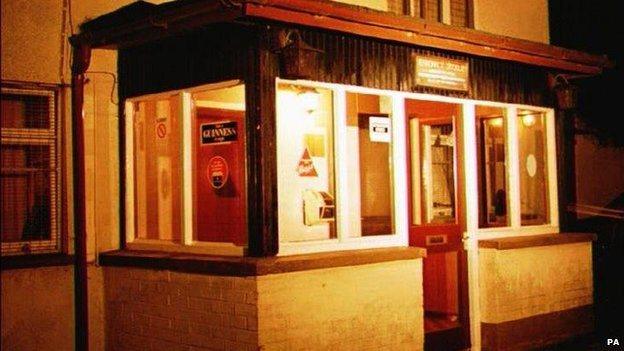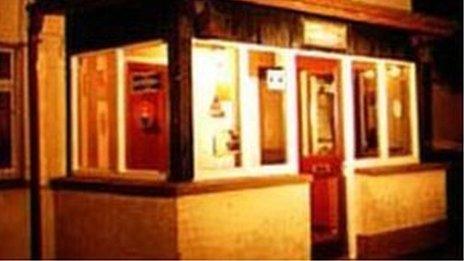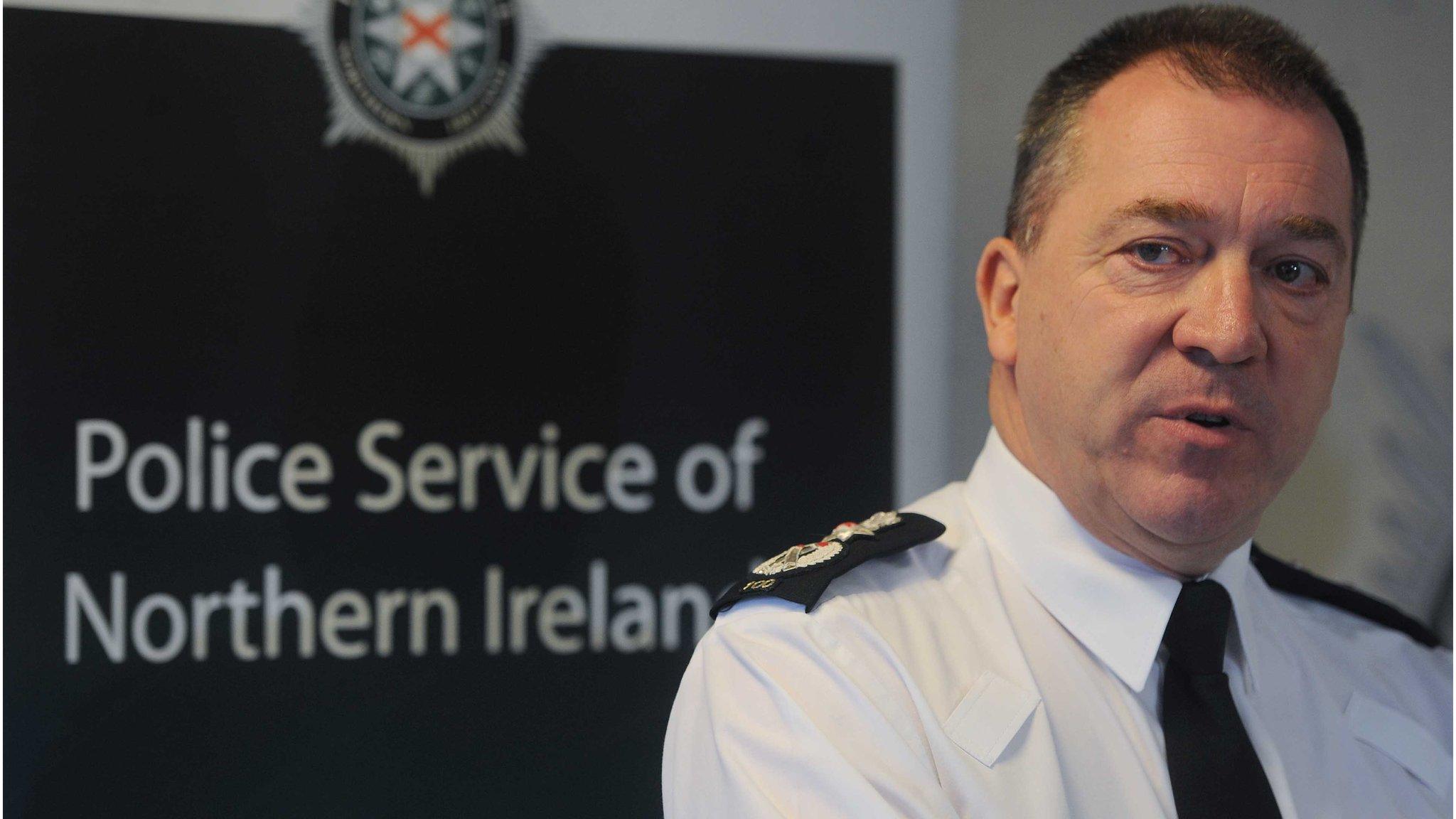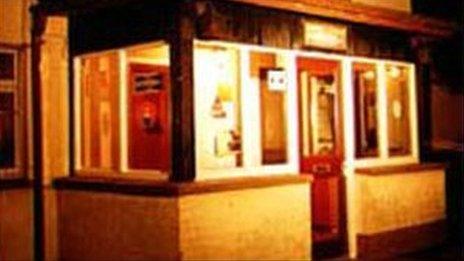Loughinisland murders: Police appeal on 20th anniversary of UVF attack
- Published
The attack took place on 18 June 1994 at the Heights Bar in Loughinisland
Police investigating the murders of six men as they watched a World Cup football match have made a fresh appeal on the 20th anniversary of the attack.
The men were shot dead by loyalist paramilitaries in a rural pub in County Down, as they watched the Republic of Ireland play Italy on 18 June 1994.
The gun attack on Heights Bar became known as the Loughinisland massacre.
The Ulster Volunteer Force (UVF) claimed responsibility but no-one has ever been convicted of the murders.
Legal battle
Colm Smyth, who was shot four times in the attack, called on those with information to come forward
The men killed in the shooting were 34-year-old Adrian Rogan, Patrick O'Hare, 35, Eamon Byrne, 39, Malcolm Jenkinson, 53, Daniel McCreanor, 59, and Barney Greene, 87.
All six were Catholic civilians. Mr Greene was one of the oldest people to be killed during the Northern Ireland Troubles.
Five other people who were also shot by the gunmen survived the attack.
Among the survivors was Colm Smyth, who was shot four times as he sat with friends watching the match.
"I wish I could say that 'it's 20 years ago and it's history and it's forgotten' but it's part of my everyday life," Mr Smyth told BBC Radio Ulster.
"It never leaves your mind because one of the guys who was there that night - and he died in my arms - was a man called Malcolm Jenkinson and he was my best friend's dad."

The six victims were watching a World Cup football match when the UVF gunmen opened fire
Mr Smyth, who has published his own memoirs of the attack, recalled how gunmen wearing boiler suits and balaclavas came to the door of the bar and opened fire.
He said Mr Jenkinson signalled a warning to him and then threw himself on top of his son's friend, in a bid to protect him from the bullets.
When the shooting stopped, Mr Jenkinson was lying motionless across Mr Smyth, who held the older man in his arms and prayed, but knew his companion was dying.
Mr Smyth wrote: "I've never witnessed someone die before, never mind my best friend's dad - a man I respect more than any other in this world. I never thought my first experience of death would be at the hands of terrorists."
He said he still suffers from "survivor's guilt", because he had persuaded a reluctant Mr Jenkinson to come with him to the pub that night.
The attack took place on the day before Fathers' Day and Mr Smyth's best friend, who was working in England at the time, had asked him to take his father out for a pint on his behalf.
"I think of the joking and the laughing and the persuading that I did during Saturday, about the fun it would be, and 'it's big match for Ireland and you know? We could beat these Italians'.
"Eventually by the end of the day - a day much like today, a nice warm summer's day - we were both in the mood for a cool pint and a bit of craic. Ultimately he died because he was there and that's something that just never goes away," Mr Smyth added.
A new criminal investigation is under way following a review of the case, but it is also at the centre of a legal battle between the Police Service of Northern Ireland (PSNI) and the watchdog, the Police Ombudsman for Northern Ireland.
Relatives of those killed have been strongly critical of the original police investigation of the case, which was carried out by the PSNI's predecessor, the Royal Ulster Constabulary (RUC).
The victims' families have said they suspect the RUC investigation was undermined in order to protect loyalist informants.
Flawed
In 2011, the former Police Ombudsman Al Hutchinson oversaw an investigation into the allegations, but found there was not enough evidence of collusion between the RUC and the loyalist gang.
The victims' relatives complained that Mr Hutchinson's investigation was flawed and they challenged his findings in court.
In December 2012, the High Court in Belfast quashed the watchdog report compiled by Mr Hutchinson, who by that stage had left his post and been replaced by Michael Maguire.
Dr Maguire is now leading a fresh police ombudsman investigation into allegations of RUC collusion in the Loughinisland massacre.
However, the ombudsman has accused the police of withholding information about 60 murders, including the Heights Bar killings.
Dr Maguire is taking the PSNI to court in an attempt to force it to hand over sensitive intelligence material about Loughinisland and other cases.
Last week, the police ombudsman was granted leave for a judicial review of the chief constable's decision to withhold the material.
The High Court heard that investigators for the ombudsman were turned away from PSNI buildings and that requests for information had been turned down on more than 100 occasions.
The judge delayed the upcoming judicial review for two weeks, to allow both parties to come to an agreement.
Speaking in the House of Commons on the anniversary of the atrocity, South Down MP Margaret Ritchie referred to the ongoing legal wrangle.
She said: "Only two weeks ago the police ensured that the police ombudsman's investigation was stalled.
"Does the prime minister agree with me that all UK police services must co-operate fully with their oversight authorities, both to the letter and the spirit, to ensure that families that I represent in Loughinisland receive truth and justice?"
Prime Minister David Cameron said everyone should co-operate with the police ombudsman.
"I believe the police ombudsman system in Northern Ireland is actually now a model that other countries are looking to follow," he said.
- Published15 June 2014

- Published13 June 2014

- Published20 December 2012
